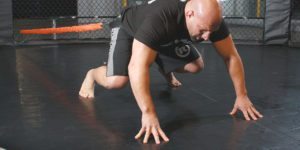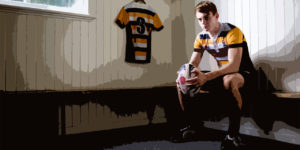Do you dream about playing professional rugby? Maybe you’d like to represent your country and play at the international level? Perhaps your dreams are even bigger – like winning the rugby World Cup?
For your rugby dreams to come true, you are going to have to commit to years of training, practice and perfecting your skills, and be prepared for plenty of knocks – both physical and psychological. You’ll also need to train as smart as you play, getting into the right teams, and being discovered by the right coaches and talent scouts.
Unfortunately, despite all your time, effort, and commitment, you may still never achieve your elite rugby goals.
And it won’t be your fault, it’ll be your genetics.
Is it all in the genes?
While hard work can conquer a lot of obstacles and barriers, it can’t beat genetics. Your genetics are the basic blueprint on which your body is built. You can train and eat to maximize your genetic potential, but the limits of your performance are preprogrammed. In the same way that you cannot change your eye color, your genetics are (currently) unmodifiable.
Genetics are inherited and are the result of your family tree. If your parents, grandparents, and great grandparents had favorable genetics for rugby, you probably will too. But, if you come from a family of champion long distance runners, you may never make an elite rugby player.
So, genetically speaking, how to do you make an elite rugger? Let’s discuss!
Size
Most successful ruggers are bigger than the average member of the population. They are not just taller, they are also naturally more muscular and have larger, heavier bones too. From a body-type standpoint, elite rugby players are much more likely to be mesomorphs, i.e. naturally muscular, lean, and strong. Endomorphs (naturally fat) and ectomorphs (naturally slim) can play rugby at a decent level but are much less likely to make it to elite status. In simple terms, they just aren’t built for it.
While muscle size is definitely a trainable characteristic, being naturally muscular and an easy gainer is always going to be an advantage in rugby. Lots of people train with weights to build muscle but a lot of them see very little progress. In contrast, some lucky people only have to look at a barbell to gain muscle mass.
Height is not modifiable and the average height of elite male ruggers is around 6’ 4”. In rugby, size matters. A good, big player will almost always beat a good, small player.
Size also determines your ideal playing position. Forwards tend to be bigger and heavier than backs although, at the elite level, the difference is less noticeable, and some backs could easily play in the forwards.
Muscle fiber type
Your muscle size and strength are determined by several factors, not least your muscle fiber type. Muscle fibers can be identified as:
- Type 1
- Type 2a
- Type 2b
Type 1 are your aerobic muscle fibers. They are small in diameter, have low force-generating potential, but are slow to fatigue. Type 2b fibers are bigger, have high force-generating potential, but are quicker to fatigue. Type 2a fibers are similar to type 2b fibers but, with training, can take on the characteristics of type 1 fibers. In other words, they are trainable.
Your dominant muscle fiber type will dictate whether you are a sprinter or a jogger. Appropriate training will always increase performance, but your ultimate level is dictated by your muscle fiber type, and that is unmodifiable. Elite ruggers have more type 2b than type 1 fibers, and that means they are more likely to be strong and powerful enough to play at an elite level.
Fitness
Like muscle size, fitness is trainable. However, the maximum amount of oxygen you can take in, transport, and utilize during exercise (VO2 max) is determined by your genetics. That’s why, despite doing lots of cardio and interval training, some players run out of wind and take longer to recover between plays.
In sports, strength athletes are often big, strong, but unfit, while endurance athletes are supremely fit but slender and even weak. In rugby, you need the fitness of a good 10k runner and the strength of a weightlifter. Such contrasting fitness characteristics are relatively rare and are the result of genetics.
Speed and agility
Speed and agility are both the result of being able to produce maximal force. However, unlike strength, which is demonstrated slowly, speed and agility are produced very quickly, and often in response to a stimulus e.g. another player.
Muscle strength is an important part of speed and agility, but the nervous system plays an even bigger role. You need to be able to turn your muscles on all-but instantly to produce maximal speed and blinding agility.
Sprint and agility training will help, but you can’t turn a cart horse into a racehorse. Elite ruggers are blisteringly fast, and not just in a straight line. Speed and agility are trainable, but genetics will dictate just how fast and agile you are.
Robustness
To play and thrive at the elite level of rugby, you need to be physically robust. Playing against similarly-genetically blessed ruggers means that you are going to get hit – hard. Impacts in elite rugby are likened to car crashes and you need to be made of the right stuff to be able to shrug off such bone-shaking hits and play on.
Full contact training, the right mental attitude, and a tolerance to pain will all help, but your body needs to be tough enough to withstand the knocks that come with elite-level rugby. If big hits leave you injured, your playing career will be short.
Take home message
Rugby is a very inclusive sport. Because of the divide between forwards and backs, there are positions that cater for a range of body shapes and fitness levels. With training, you will always be able to improve your fitness and strength for rugby.
However, as you progress from club rugby to the elite game, genetics become more important. Training hard will always have a positive effect on your performance, but that performance has a ceiling.
Elite ruggers are born AND made. To succeed at the highest level, you need genetics, hard work, and some luck too.
Does that mean that, if you aren’t genetically blessed, you should quit rugby and take up another sport? Of course not! But you should consider your genetics when deciding which position to play in. Understand too that, even if you train hard, you may never make it to the elite level. Being realistic now could save you years of frustration and disappointment. Sadly, we can’t all be elite ruggers.


